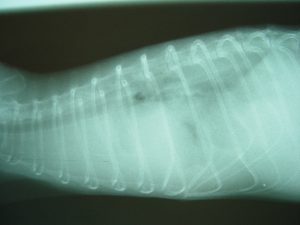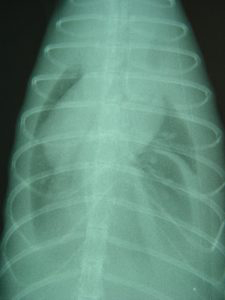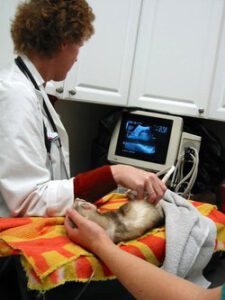 Heart disease is relatively common in middle aged to older ferrets. Symptoms may include decreased appetite, lethargy, generalized or rear leg weakness, labored breathing, purplish or pale gums, coughing, and/or abdominal enlargement from fluid accumulation. Either weight loss or weight gain (from fluid) can also be observed. In the early stages of heart disease, there may be no symptoms. As the heart disease progresses, mild signs often start to develop and then more severe signs. The severe signs are generally seen when the heart cannot keep up with its job of circulating the blood in the body, and therefore fluid backs up in the lungs and/or abdomen. This is called congestive heart failure.
Heart disease is relatively common in middle aged to older ferrets. Symptoms may include decreased appetite, lethargy, generalized or rear leg weakness, labored breathing, purplish or pale gums, coughing, and/or abdominal enlargement from fluid accumulation. Either weight loss or weight gain (from fluid) can also be observed. In the early stages of heart disease, there may be no symptoms. As the heart disease progresses, mild signs often start to develop and then more severe signs. The severe signs are generally seen when the heart cannot keep up with its job of circulating the blood in the body, and therefore fluid backs up in the lungs and/or abdomen. This is called congestive heart failure.
If you observe your ferret showing any of these signs, you should bring them to your veterinarian for an examination. The veterinarian can listen to the ferret’s heart with a stethoscope to check for an abnormal rhythm or heart murmur. Not all ferrets with heart disease will have a detectable murmur or arrhythmia, but if present, this helps to confirm heart disease.
 If heart disease is suspected, x-rays are usually the next step. An enlarged, rounded heart and fluid in the lungs are common findings with heart disease. If the x-rays indicate a heart problem, a cardiac ultrasound is recommended. The ultrasound can evaluate the heart function, whether the heart wall is thickened or too thin, and how the heart valves are working. The two tests together help to provide a picture of how severe the heart disease is and help the veterinarian decide the type and dose of medications that need to be administered. Pictured below is an X-ray of a ferret with obvious heart failure.
If heart disease is suspected, x-rays are usually the next step. An enlarged, rounded heart and fluid in the lungs are common findings with heart disease. If the x-rays indicate a heart problem, a cardiac ultrasound is recommended. The ultrasound can evaluate the heart function, whether the heart wall is thickened or too thin, and how the heart valves are working. The two tests together help to provide a picture of how severe the heart disease is and help the veterinarian decide the type and dose of medications that need to be administered. Pictured below is an X-ray of a ferret with obvious heart failure.
Medications for heart disease help to decrease the workload on the heart, control the blood pressure, and keep fluid from accumulating in the lungs. Heart disease cannot be cured, but it can be managed. This can increase the length and the quality of the ferret’s life. The ferret will need to be evaluated regularly to evaluate whether any adjustment is needed in the dose of medication. The dose of medication depends on the individual ferret and the severity of the heart disease. Bloodwork will also need to be monitored to make sure there are no adverse effects from the medications. See this page for the vitamin supplement we recommend for your pet!
Most heart disease develops as the ferret ages and cannot be prevented. Once heart disease is diagnosed though, the progression of the heart disease can often be slowed down with medications. An exception to this is heartworm disease. It is much easier to prevent heartworms than to treat them. Heartworms are spread by mosquitoes. If your ferret goes outdoors or has exposure to mosquitoes, a monthly heartworm preventative prescribed by your veterinarian can be given. Please refer to the Heartworm Disease page on this site for further information.

If you have any questions, please feel free to call us at (502) 241-4117.

